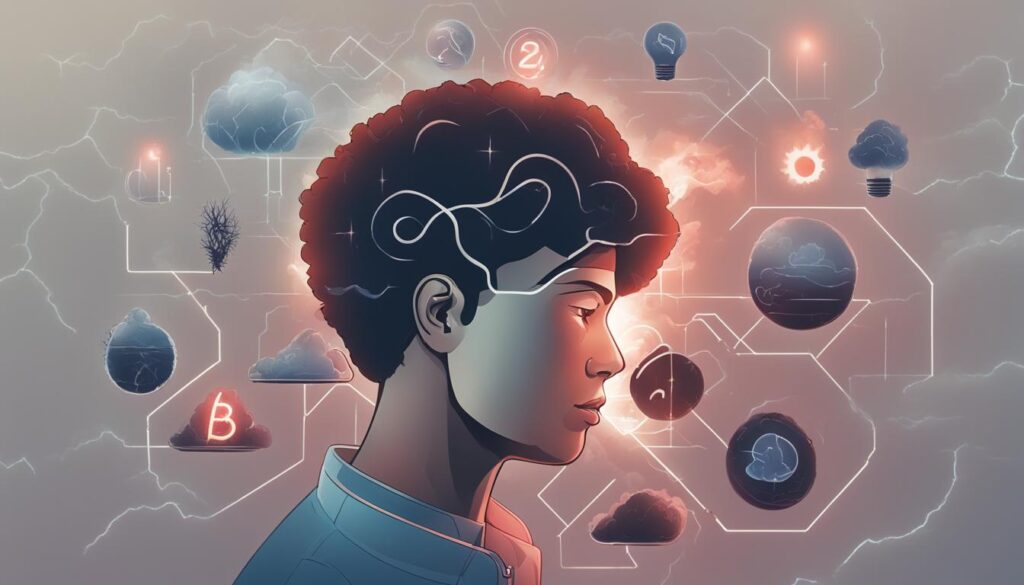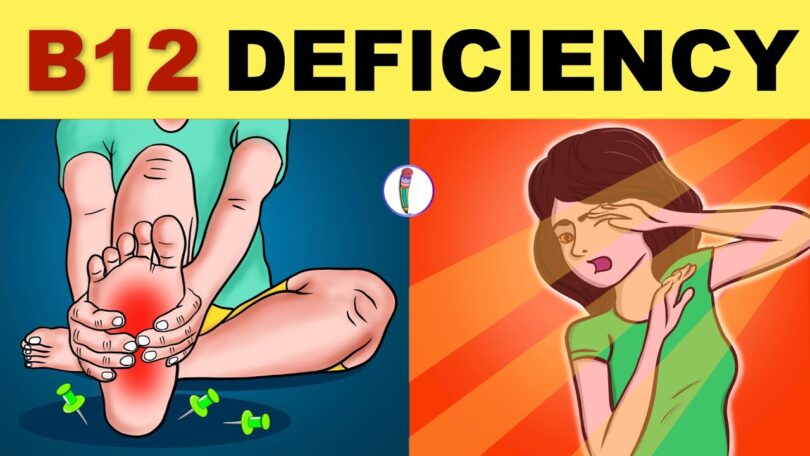If you’re experiencing fatigue, weakness, and mood changes, it could be a sign of something more than just a hectic schedule or everyday stress. These are just a few of the potential signs of a B12 deficiency, which can occur when your body doesn’t get enough vitamin B12. This essential nutrient plays a vital role in various bodily processes, like forming red blood cells and maintaining healthy nerves.
It’s crucial to recognize and address a B12 deficiency, as it can negatively impact your overall health and well-being. In this article, we will explore the seven warning signs of a B12 deficiency so you can identify them and take appropriate action.
Key Takeaways
- B12 deficiency signs include fatigue, weakness, and cognitive impairment.
- Pale or jaundiced skin, tingling or numbness, and digestive issues are also potential signs of a B12 deficiency.
- Consult a healthcare professional for proper diagnosis and treatment if you suspect a B12 deficiency.
- Dietary adjustments and supplements can help address a B12 deficiency.
- Early detection and intervention of a B12 deficiency can prevent long-term health problems.
Fatigue and Weakness

One of the key signs of a b12 deficiency is fatigue and weakness. If you often feel tired even after getting enough sleep or experience weakness in your muscles, it may be a result of low b12 levels in your body. It’s important to recognize the symptoms of a b12 deficiency early on to prevent potential complications. If you are experiencing fatigue and weakness, consult a healthcare professional to determine if a b12 deficiency may be the cause.
Pale or Jaundiced Skin

If you have noticed that your skin appears pale or yellowish, it might be a sign of a B12 deficiency. This happens because the body produces fewer red blood cells when it lacks vitamin B12. The condition can also cause jaundice, which is a yellow discoloration of the skin and eyes. If you notice this symptom, it’s essential to seek medical attention promptly for diagnosis and treatment.
What is Jaundice?
Jaundice is a condition in which the skin and eyes turn yellow. It occurs when the body produces too much bilirubin, a yellow pigment found in bile. Bilirubin is typically removed from the bloodstream by the liver and excreted in the stool. However, when the liver is damaged or not functioning correctly, the bilirubin accumulates in the body, leading to jaundice.
How Does B12 Deficiency Cause Jaundice?
Vitamin B12 is required to produce healthy red blood cells. When your body is deficient in this vitamin, it can result in anemia, a condition in which your body doesn’t have enough red blood cells to transport oxygen throughout the body. One of the causes of anemia is a low level of bilirubin in the blood. When there is a low level of bilirubin in your blood, the skin and eyes can take on a yellow appearance.
Shortness of Breath and Dizziness

Feeling short of breath or experiencing dizziness can be a sign of a B12 deficiency. The body requires adequate levels of B12 to make enough red blood cells that carry oxygen throughout the body. When B12 levels are low, the body cannot make enough red blood cells, leading to low oxygen supply and ultimately causing shortness of breath and dizziness.
To address these symptoms, you should consult a healthcare professional to determine the root cause of your B12 levels. Depending on the severity of your deficiency, they may recommend B12 supplements, dietary changes, or other treatments to resolve the issue.
Tingling and Numbness

If you experience tingling and numbness in your hands and feet, it may be a sign of a B12 deficiency. This sensation, known as peripheral neuropathy, is caused by nerve damage resulting from inadequate B12 levels. Over time, this damage can become irreversible, making it crucial to recognize and address it as soon as possible.
Furthermore, in severe cases, peripheral neuropathy can lead to difficulties with fine motor skills and muscle weakness, further emphasizing the importance of treating the deficiency.
Tip: If you recognize these symptoms in yourself or someone close to you, make sure to seek medical advice and get tested for B12 deficiency. Addressing the deficiency can help alleviate these and other related symptoms.
Cognitive Impairment

Do you struggle with memory loss or difficulty concentrating? These could be warning signs of a B12 deficiency. Studies have shown that low B12 levels can have a significant impact on brain health, potentially leading to cognitive impairment and even dementia in severe cases.
It’s important to address these symptoms promptly to prevent further cognitive decline. If you experience memory loss or difficulty concentrating, consult your healthcare provider and get your B12 levels checked.
“Deficiencies in vitamins B12 and D are associated with neurological and neuropsychiatry dysfunction.” – BMC Psychiatry
Mood Changes and Depression

Do you often feel sad or experience a persistent feeling of hopelessness? Mood changes, including depression, can be a result of a B12 deficiency. B12 plays a critical role in producing neurotransmitters that regulate mood, and a deficiency can lead to imbalances. Inadequate B12 levels can negatively affect brain health, leading to cognitive impairment and psychiatric symptoms such as depression, anxiety, and even dementia in severe cases.
If you experience these symptoms, it’s essential to consult a healthcare professional to identify the root cause. Do not ignore the critical signs of a B12 deficiency, as timely intervention can make a significant difference in your overall well-being.
Digestive Issues

If you are experiencing digestive issues such as bloating, diarrhea, or constipation, it could be a sign of a B12 deficiency. Inadequate B12 levels can impact the digestive system, leading to gastrointestinal disturbances.
If you have been experiencing any of these symptoms along with the other signs of B12 deficiency, it is important to consult with a healthcare professional to determine if your symptoms are related to low B12 levels.
Note: If you have a preexisting digestive issue, it can sometimes interfere with the absorption of vitamin B12. So, it is essential to address B12 deficiency to avoid further complications.
Vision Problems
Vision problems can be a warning sign of a B12 deficiency. Blurred or disturbed vision can occur when the optic nerve is affected due to insufficient B12 levels in the body. If left untreated, this deficiency can worsen and even lead to permanent vision damage.
To help prevent vision problems associated with a B12 deficiency, it’s important to maintain adequate B12 levels through a balanced diet or supplements. Consult with your healthcare professional to determine the best treatment plan for your specific needs.
Balance and Coordination Difficulties
Are you experiencing balance and coordination difficulties? If so, it could be a warning sign of a B12 deficiency. Vitamin B12 plays a crucial role in maintaining the health of your nervous system, and insufficient B12 levels can lead to motor skill impairment. In some cases, the symptoms can be severe and affect daily activities, such as walking or driving.
If left untreated, the B12 deficiency can lead to irreversible nerve damage, so it’s vital to identify and address the issue promptly. Consult with your healthcare professional if you experience any of these warning signs, and discuss the appropriate course of action. With proper treatment and dietary changes, it’s possible to restore your B12 levels and prevent further complications.
Addressing a B12 Deficiency
If you suspect that you have a B12 deficiency, it is essential to consult a healthcare professional for proper diagnosis and treatment. Your doctor may conduct blood tests to determine your B12 levels and recommend supplements or dietary adjustments to address the deficiency.
Dietary sources of B12 include meat, fish, dairy, and eggs. If you are vegan or follow a plant-based diet, it may be challenging to get enough B12 from food alone. In such cases, your doctor may recommend B12 supplements or injections.
You may need regular B12 check-ups to monitor your levels and adjust treatment accordingly. Taking B12 supplements as prescribed and maintaining a healthy diet can help prevent and treat a deficiency.
“Don’t ignore the warning signs of a B12 deficiency. Addressing the issue promptly can help prevent long-term health complications.”
Conclusion
In conclusion, recognizing and understanding the warning signs of a B12 deficiency is crucial for maintaining optimal health. If you experience any of these symptoms, it is important to seek medical advice and address the deficiency with proper treatment and dietary adjustments. Don’t overlook the critical signs of a B12 deficiency, as timely intervention can make a significant difference in your overall well-being.
Remember, your body sends signals when it is lacking essential nutrients like B12. It is up to you to pay attention to these warning signs and take action to improve your health. Maintaining a well-balanced diet and seeking medical advice can help you address a B12 deficiency effectively.
By taking care of your body and addressing a B12 deficiency promptly, you can avoid potential health risks and lead a healthy, happy life. So, take charge of your health and make informed decisions to ensure optimal well-being.
FAQ
What are the 7 warning signs of a B12 deficiency?
The 7 warning signs of a B12 deficiency include fatigue and weakness, pale or jaundiced skin, shortness of breath and dizziness, tingling and numbness, cognitive impairment, mood changes and depression, digestive issues, vision problems, and balance and coordination difficulties.
How can I recognize a B12 deficiency based on fatigue and weakness?
Feeling tired even after getting enough sleep and experiencing weakness in your muscles are common signs of a B12 deficiency. If you frequently feel fatigued and weak, it may be a result of inadequate B12 levels in your body.
What does pale or jaundiced skin indicate in relation to a B12 deficiency?
Pale or jaundiced skin can be a warning sign of a B12 deficiency. If your skin appears pale or yellowish, it could be a result of decreased red blood cell production caused by a lack of B12 in your body.
How does a B12 deficiency relate to shortness of breath and dizziness?
Feeling short of breath or experiencing dizziness can indicate a B12 deficiency. Insufficient levels of B12 can lead to a low red blood cell count, resulting in decreased oxygen supply to the body.
What role does a B12 deficiency play in tingling and numbness?
Tingling and numbness, especially in the hands and feet, can be a sign of a B12 deficiency. Insufficient B12 levels can cause nerve damage, leading to peripheral neuropathy.
Can a B12 deficiency cause cognitive impairment?
Yes, cognitive impairment such as memory loss and difficulty concentrating can be linked to a B12 deficiency. Inadequate B12 levels can affect brain health and cognitive function.
How does a B12 deficiency contribute to mood changes and depression?
Mood changes, including depression, can result from a B12 deficiency. B12 plays a critical role in producing neurotransmitters that regulate mood, and a deficiency can lead to imbalances.
What digestive issues can be associated with a B12 deficiency?
Digestive issues such as bloating, diarrhea, or constipation can occur with a B12 deficiency. Inadequate B12 levels can impact the digestive system, leading to gastrointestinal disturbances.
Can a B12 deficiency affect vision?
Yes, a B12 deficiency can cause vision problems, including blurred or disturbed vision. Insufficient B12 levels can affect the optic nerve, resulting in vision changes.
How does a B12 deficiency relate to balance and coordination difficulties?
Balance and coordination difficulties can be a warning sign of a B12 deficiency. B12 is essential for maintaining the health of the nervous system, and a deficiency can affect motor skills.
How can I address a B12 deficiency?
If you suspect a B12 deficiency, it is important to consult a healthcare professional for proper diagnosis and treatment. They may recommend B12 supplements or dietary adjustments to address the deficiency.


Leave a Comment